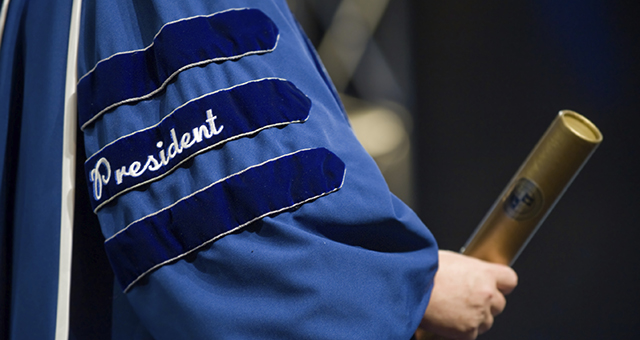More Tools for the New Dean’s Toolbox
A couple years ago, I wrote an essay for Academic Leader suggesting that new deans should examine the administrative implements in their metaphorical "toolbox" to make sure they were ready for the job at hand: providing leadership to their institution when difficult dilemmas require effective administrative action. Those tools included: (1) a...
When Good Professors Turn into Bad Deans
“Thanks for your ‘Dean’s Dialogue’ columns, Tom—you offer some good advice to deans and other administrators. But it seems like your deans are always noble and virtuous while the faculty they lead are villains and miscreants. What happens when good professors turn into bad deans?” This was the gist of...
Academic Leader as Communicator-in-Chief
Those of us who have served our institutions as deans or provosts know that leadership requires many skills—some of which we bring to the job and some of which we develop in office. I think that the ability to communicate effectively is one that is always a work in progress—partly...
My Last Commencement Speech
In 2007, professor Randy Pausch presented what he titled “Really Achieving Your Childhood Dreams” in the “My Last Lecture” series at his university, Carnegie Mellon. He had been diagnosed with terminal cancer only a month earlier and had only a few more months to live. With amazing optimism and energy,...
The Cost of Leadership
As a recently retired academic leader—a former department chair, division head, dean, vice president, provost, and interim president—I have had time to reflect on the joys and woes of leadership at a small liberal arts college. What successes did I have? What failures? What could I have done differently that...
The ‘Quiet’ Dean: Rethinking the ‘Extrovert Ideal’ of Leadership
I am sitting quietly in my dean’s office, a serene place I first occupied in 1986, reflecting on a book by Susan Cain, one that I think you all should read, titled Quiet: The Power of Introverts in a World That Can’t Stop Talking. I would much rather communicate to...
Freedom of Speech Issues: A Legal Primer for Academic Leaders
Today’s college campus is a laboratory for the US Constitution’s First Amendment provision declaring that government may not “abridge” a citizen’s individual rights with respect to five related freedoms: religion, speech, press, assembly, and petition. Public colleges and universities must honor these rights and protect them, but private institutions are...
The ‘Quiet’ Dean: Rethinking the ‘Extrovert Ideal’ of Leadership
Memo to academic leaders: I am sitting quietly in my dean’s office, a serene place I first occupied in 1986, reflecting on a book by Susan Cain, one that I think you all should read, titled Quiet: The Power of Introverts in a World That Can’t Stop Talking. I would...










